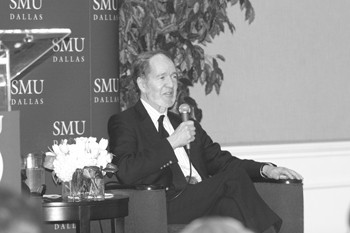
Anthropologist and author Jared Diamond answers questions at the Tate lecture student forum. (Christina Parrish)
Scientist, societal historian and author Jared Diamond was on campus Wednesday for the Tate Lecture Series. During the Student Forum, Diamond put significant emphasis on the impact of voting. When asked what people can do in a lifetime to keep their societies from collapsing? Diamond said you can vote for change.
“The simplest and cheapest thing you can do is vote,” he said.
Western societies may be on the road to collapsing depending on how the younger generations vote said Diamond. He also said persuading parents to vote in favor of environmentally friendly causes will help keep societies alive. Doing things to help cut down on global warming and toxic waste such could aid in maintaining societies.
“If your parents drive a hybrid ,compliment them. If they drive a Hummer, ask them to defend themselves,” said Diamond.
Europeans have made the necessary changes which the United States need to make, said Diamond, who just returned from Germany where gas was $7 a gallon.
“I wish gas would sell for $7 in the U.S. like in Germany,” said Diamond.
Americans would have to adopt European gas prices in order for society to change with regard to climate control, said Diamond.
“It would be really easy to address climate change; all we need is the political will,” said Diamond.
The scientist also said that changes will happen if the American people want them.
Diamond used the Wal-Mart corporation as an example. Wal-Mart recognized its trucks were consuming too much gas and the corporation is working to improve the problem. People profit and lose from globalization said Diamond.
When asked about his stance on nuclear weapons, Diamond said getting rid of them is not a possibility. Nuclear weapons keep countries from entering into another world war and countries less mature want to get their hands on them, he added.
“Its one of the big risks of our future. Stay tuned,” said Diamond.
Diamond authored seven books including, “Guns, Germs, and Steel: The Fates of Human Societies” which won a Pulitzer Prize in 1998.
Diamond is a graduate of Cambridge University in England where he earned a Ph.D. in physiology and membrane biophysics. He earned his B.A. from Harvard University.
Diamond is currently a professor of geography at the University of California-Los Angeles.








